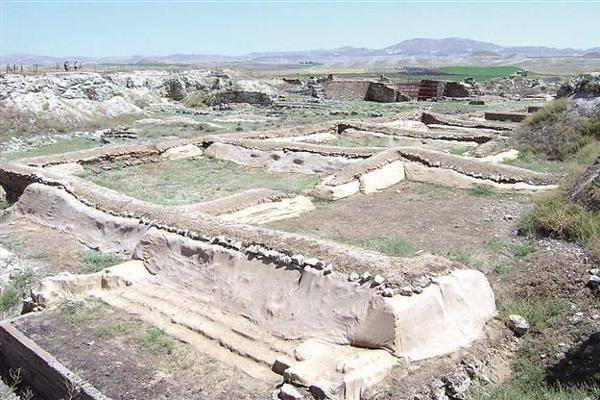US instructors work on Anatolia's Phrygian capital
ANKARA - Anatolia News Agency


Pennsylvania Museum specialist Ayşe Gürsan Salzmann makes a presentation about archaeological excavation work in Ankara’s ancient city of Gordion. AA photo
U.S. Pennsylvania Museum specialists who are conducting excavation work at the ancient city of Gordion in Central Anatolia made a presentation on July 4 at the Polatlı Municipality City Hall.Information about the excavations and the protection of the ecosystem were the major topics of the presentation.
Gordion was the capital of the ancient Phrygian civilization, and is now located next to the village of Yassıhöyük, near the modern town of Polatlı.
“Our concern is that the tumuli and mounds are completely surrounded by fields, which means that we are losing the history. We want to prevent this by cooperating with the municipality,” Pennsylvania Museum specialist Ayşe Gürsan Salzmann said in her presentation. She said it was not a classical excavation in Gordion, so it was progressing slowly.
“We won’t discover large buildings, baths or stadiums, it’s just a detection of the buildings and ecosystem of that period. Excavations will go on in Yassıhöyük.”
Environment conditions
Also speaking at the presentation, Naomi Miller of the Pennsylvania Museum said the fields should not be plowed and that they aimed to enrich the environmental economics and develop tourism by protecting the mounds.
“The most economical and permanent conservation plan should comply with the environment conditions. We started with the eco-park work as an excavation team. This is a four-part project. We are making an erosion control plan on Midas tumulus. We established a weed garden in Yassıhöyük. We use plants to protect the archeological site. We would like to expand the protected area in order to save the small mounds and historical landscape,” said Miller.
Mayor Yakup Çelik, University of North Carolina instructor and the head of the Gordion archeological excavations, Professor Kenneth Sams, Professor Brian Rose also joined the presentation.
